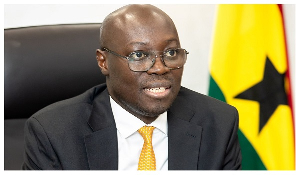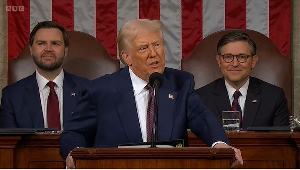Ghana Chamber of Mines (GCM) has inaugurated an ultra-modern and intelligent grid-tied solar photovoltaic (PV) system at its secretariat.
The PV system, which has the capacity to power the entire secretariat during working hours, has an installed capacity of 84kWp and was constructed at a total cost of USD 122,316.35.
At peak conditions, the system has the capacity to generate 111,000 kWh, and its use has reduced the Chamber’s consumption of electricity from the national grid by nearly 75 per cent.
Speaking at the inauguration ceremony on Tuesday April 4, 2023, the CEO of the Chamber, Dr. Sulemanu Koney, noted that the investment represents the Chamber’s commitment to promoting sustainable energy and reducing its carbon footprint as embodied in Sustainable Development Goal (SDG) 7 and further symbolizes the mining industry’s transition from reliance on fossil-based energy to cleaner alternatives.
“This system is about more than just reducing our carbon footprint. It is also about leading by example and inspiring others to follow in our footsteps as an institution at the fore front of promoting environmentally and socially responsible mining.
"As a responsible corporate citizen, we have a duty to do our part in protecting the environment and promoting sustainable practices. Investing in this solar PV system demonstrates our commitment to sustainable development and it is our expectation that our actions will inspire others to follow suit and take similar steps to reduce their impact on the environment,” he stressed.
Inaugurating the solar PV system, the First Vice President of the GCM, Ign. George Nutor, observed that the need for to move to clean energy has never been more apparent than in these times of climate change effects.
“The effects of extreme weather conditions amidst unexpected rain patterns, “what have you”, have shown the need for us to pay critical attention to issues of clean energy and sustainability, especially for those of us in the mining industry,” he stressed.
He noted that renewable energy sources are available all over Ghana, and their potential is yet to be fully harnessed.
“Cheap electricity from renewable sources could provide a chunk of Ghana’s total electricity supply and decarbonize the power sector by massively cutting carbon emissions and helping to mitigate climate change,” he observed.
He cautioned that Ghana is on an industrialization drive and the demand for energy will increase to meet the rising demands of industries, and in this regard, Ghana’s dependency on fossil fuels is not sustainable, hence there is a need to consider alternative sources of energy especially clean energy to catalyse sustainable development.
“Recent geopolitical situations such as the Russian-Ukraine conflict have affected our supply chain and operational viability. This situation presents an opportunity for us to have a clear-cut political commitment to develop a growth strategy and circular economy with clean energy at the center. Globally, economies are evolving to address present and future energy demands. Our country must also evolve and take advantage of all the natural resources to develop its own homegrown programmes for socio-economic development,” he challenged the decision makers.
“Given the effects of climate change and our aspirations of promoting environmentally and socially responsible mining in Ghana, improving energy efficiency and transitioning to clean energy are just some of the ways of ensuring sustainability and mitigating the effects of climate change in Ghana.
The mining industry is increasingly exposed to Environment, Social and Governance (ESG) risks, including climate change. Further, the Sustainable Development Goal 7 encourages everyone to increase the share of renewable energy in the global energy mix. Thus, the confluence of these factors spurs us to continue working towards sustainable best practices for our collective good. It is against this backdrop that some of the members of the Chamber liaising with the Volta River Authority (VRA) to finance solar PV projects that will complement the government’s effort to diversify the country’s energy mix away from fossil-based energy.
For instance, Newmont was the off-taker for VRA’s 13 MW Kaleo solar project located in the Upper West Region while AngloGold Ashanti is in the process of installing a 100 MW solar project for its Ghana operations with the support of VRA. Likewise, the Gold Fields owned mines in Ghana, Tarkwa and Damang mines, the Edikan Mine of Perseus Mining (Ghana) Ltd, and Wassa Mine of Golden Star Resources Ltd, obtain their electricity from Genser’s gas-fuelled power plants. Further, some mining companies have installed solar PVs at their site to reduce their carbon footprint. A classic example is the 110 kWp solar plant at Newmont Akyem that provides power to residential facilities.
The CEO of the Chamber was however unhappy with tax component in installing the solar PV system. He said “nearly 11 per of the contract cost represents statutory taxes and levies, which is a disincentive to the government’s energy transition agenda”.
While the government has exempted imported solar panels from VAT and other levies, the payments for a completed project are still subject to these statutory taxes and levies.
He noted further that, the absence of a net metering system implies that a consumer would be subsidizing the operational cost of ECG anytime the solar plant feeds its excess generation beyond its demand into the national grid.
“We implore the government, particularly, the Public Utility Regulatory Commission (PURC), to expedite its work on the net metering framework,” he urged.
Background
The journey to reduce the Chamber’s dependence on the national grid commenced in 2020 with approval by the Council for the Secretariat to construct a solar PV system. The Secretariat invited prospective vendors to submit bids for the project and subsequently constituted a panel to evaluate the received bids and make a recommendation to the Chamber.
The eminent panel, comprising the Chairman of the Energy Committee, Dr. Sam DeSouza, the Executive Director of Energy Foundation, Ing. Stephen Duodu, and the Director, of Southern Network Development of GRIDCo, Ing. Mark Baah recommended a Ghanaian firm, Stella Futura, to execute the project, which was also accepted by Council.
The payback period for the project is estimated to be under eight years based on a set of assumptions on the exchange rate and electricity tariff. The infrastructure has a warranty period of 10 years and a performance period of 25 years.
Press Releases of Wednesday, 5 April 2023
Source: Ghana Chamber of Mines





![CEO Dr Sulemanu Conney [right] with First Vice President of the GCM, Ing. George Nutor CEO Dr Sulemanu Conney [right] with First Vice President of the GCM, Ing. George Nutor](https://cdn.ghanaweb.com/imagelib/pics/498/49885231.295.jpg)











